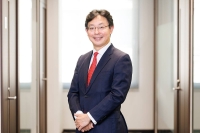It has been 15 years since the founding of B-Lot Co., a real estate investment, consulting and management company, and nine years since it was publicly listed. It is still a relative youngster in the industry, which is also polarized between giant players serving large enterprises and small ones targeting individual customers and small businesses.
B-Lot has successfully held a unique position of focusing on small to medium-size investment properties for wealthy individuals and small to medium-size real estate agents and companies. “The locations and purposes of use vary, and so do the prices, from ¥100 million to ¥3 billion ($700,000 to $21 million),” said Makoto Miyauchi, its CEO. “We not only sell, buy and manage properties but also serve as an agent for those looking for investment properties and do everything else related to real estate.”
What makes B-Lot unique is not just its customer base. The life span of buildings in Japan is relatively short, especially in urban areas. This may be due to the persistent notion that new is better, and a scrap-and-build mentality during the economic boom of the past. “A building constructed in 1980 is considered old and torn down in most cases. We try to think about how we can renovate and add value to it,” Miyauchi said.
Destroying and constructing buildings consumes a lot of energy and materials. Existing buildings are resources that are still usable, and modern technologies for reducing environmental impacts and improving sustainability can be applied to old buildings as well as new ones. “Energy-saving air conditioners and building materials such as insulators, solar panels — these things can be installed in old buildings, which is more sustainable than demolishing them and building new ones,” he said.
This is better for existing tenants and residents too. “Let’s say there is a building with a 20-tenant capacity, and only four rooms are occupied. The conventional way would be to ask the four tenants to move out and to destroy the building,” Miyauchi said. But B-Lot does not blame a building’s unpopularity on its age. It tries to renovate the building to make it more attractive to new tenants while existing tenants stay and carry on with their business.
As long as the structure itself is strong or can be reinforced adequately, it makes more sense to keep existing buildings. Only about 10% of the 60 or so buildings that B-Lot currently owns are new. Since core members have abundant experience in renovating old buildings, Miyauchi has confidence in the company’s ability to fix up buildings and attract new tenants and residents with increased comfort and satisfaction as well as reduced costs thanks to improved energy efficiency.
It also provides various new services to meet people’s changing needs. “Due to the coronavirus pandemic, demand has been increasing for high-speed home internet, soundproofing and secure package-drop services,” Miyauchi said. B-Lot tries out various third-party services at the properties it owns and recommends the best ones for the buildings it maintains for clients. It also has two solar power generation facilities in Ibaraki Prefecture. “In addition to the purpose of reducing electricity cost and the social significance of solar power generation, such as the utilization of vacant land and the reduction of carbon emissions, there are things we can only learn by doing — for example, that the level of power generation drops when panel surfaces get dirty, and what kinds of measures and procedures need to be taken during a disaster,” he explained.
B-Lot’s properties and services have been appreciated by international as well as domestic clients. “We sold a property worth several billion yen to our first foreign client, from Singapore, about 10 years ago,” Miyauchi said. Since then, the company has been serving clients from various places, including China, Taiwan, Hong Kong and South Korea.
There are English-speaking members in the company, including Miyauchi himself, who lived in the United States for 3½ years. Some employees are from Chinese or Korean-speaking countries. “The real estate industry is quite domestic, and there are many business practices and laws that are unique to each country, which makes communication of utmost importance,” Miyauchi said. “At the same time, we provide a one-stop service to meet all needs related to real estate and ensure long-lasting relationships with our clients.”






















With your current subscription plan you can comment on stories. However, before writing your first comment, please create a display name in the Profile section of your subscriber account page.